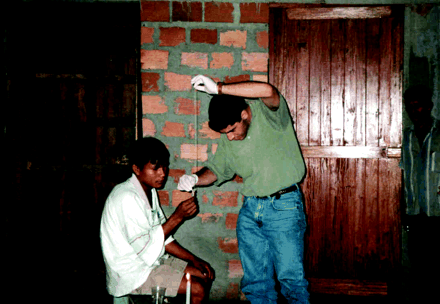Medical students bring many things back to Canada after travelling abroad. Daniel Roth brought an enthusiasm for global health issues that he felt driven to share with his fellow students at the University of British Columbia (UBC), and the result was a student-run conference on global health ethics ( www.med.ubc.ca/ethicsworkshop) that attracted nearly 20 presenters, including experts from South Africa, Peru, Bosnia and Cameroon.

Figure. Working by candlelight: Dr. Daniel Roth at work in Peru Photo by: Coutesy Daniel Roth
Roth, now a pediatrics resident in Edmonton, says UBC's medical school offers little teaching on international issues. Most of the 20 students who organized the conference, Toward Equality in Global Health: Do Ethics Matter?, and the 75 who attended were exploring the field for the first time. Roth says their “passion showed me [they] have been really eager to have the opportunity to talk about this. People left thinking, ‘wow, this is really important.’ ”
It was already important to Roth. During an elective in South Africa, he came face to face with the impact AIDS is having in countries not equipped to deal with it. In Hlabisa, a city of 200 000 near Durban, most patients with tuberculosis or AIDS see traditional healers before coming to the hospital in the final stages of disease.
“The overwhelming preponderance of disease related to being ravaged by HIV,” he says. “When you are there you not only see the burden of illness but also the context.” About 30% of people in the Hlabisa region are infected with HIV.
During his stay, the South African government abruptly altered its AIDS policies, allowing nursing mothers with HIV/AIDS to take antiretroviral drugs to prevent transmission to their babies. However, he says there will still be no infrastructure available to deal with the generation of orphans AIDS is producing.
Roth's interest in global health dates to the year he spent in the shantytowns of Lima and in rural Peru after his second year in medical school. His motivation came from his dual interests in research and international health.
His Peruvian projects included studies of the informed-consent process and of vitamin D deficiency in adults with TB. He found that informed consent inevitably led to a clash of cultural values that was compounded by bureaucracy and by concepts that do not translate well into Spanish. He said Peruvians found it hard to comprehend that they had to be asked permission to let doctors perform a procedure that they had already been assured would do them no harm.
Roth's passionate interest in international health also led him to pen the winning entry in the student/resident category of CMAJ's annual essay contest, “Humanitarian aid and medical research: an illusion of dichotomy in international health” (CMAJ 2000;164 [13]: 1862-3).
Roth would like UBC to spend more time teaching medical students about global health issues; a section on global ethics has recently been added to a health care ethics course. “When students learn about HIV, it should be emphasized that this is a global problem,” he says. “I think every medical student should have some understanding of these issues.”
Roth says his experience in Peru helped him to choose his specialty because it “gave me some sense of direction.” He is still involved with Peruvian research projects and may spend more time in South America during his residency. — Heather Kent, Vancouver







